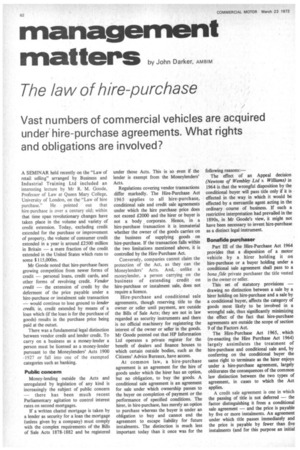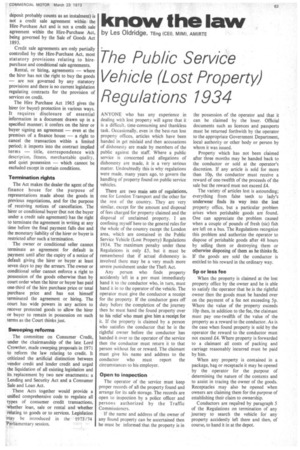management
Page 60

Page 61

If you've noticed an error in this article please click here to report it so we can fix it.
matters by John Darker, AMBIM
The law of hire-purchase
Vast numbers of commercial vehicles are acquired under'hire-purchase agreements. What rights and obligations are involved?
A SEMINAR held recently on the "Law of retail selling" arranged by Business and Industrial Training Ltd included an interesting lecture by Mr R. M. Goode. Professor of Law at Queen Mary College, University of London, on the -Law of hire purchase." He pointed out that hire-purchase is over a century old: within that time span revolutionary changes have taken place in the volume and variety of credit extension. Today, excluding credit extended for the purchase or improvement of property, the volume of consumer credit extended in a year is around 12500 million in Britain — a mere fraction of the credit extended in the United States which runs to some $ 115,000m.
Mr Goode noted that hire-purchase faces growing competition from newer forms of credit — personal loans, credit cards, and other forms of revolving credit. Vendor credit — the extension of credit by the deferment of the price payable under a hire-purchase or instalment sale transaction — would continue to lose ground to lender credit, ie, credit extended by means of a loan which (if the loan is for the purchase of goods) results in the purchase price being paid at the outset.
There was a fundamental legal distinction between vendor credit and lender credit. To carry on a business as a money-lender a person must be licensed as a money-lender pursuant to the Moneylenders' Acts 1900 -1927 or fall into one of the exempted categories such as banking.
Public concern
Money-lending outside the Acts and unregulated by legislation of any kind is increasingly the subject of public concern — there has been much recent Parliamentary agitation to control interest rates on second mortgages.
If a written chattel mortgage is taken by a lender as security for a loan the mortgage (unless given by a company) must comply with the complex requirements of the Bills of Sale Acts 1878-1882 and be registered under those Acts. This is so even if the lender is exempt from the Moneylenders' Acts.
Regulations covering vendor transactions differ markedly. The Hire-Purchase Act 1965 applies to all hire-purchase, conditional sale and credit sale agreements under which the hire purchase price does not exceed £2000 and the hirer or buyer is not a body corporate. Hence, in a hire-purchase transaction it is immaterial whether the owner of the goods carries on the business of supplying goods on hire-purchase. If the transaction falls within the two limitations mentioned above, it is controlled by the Hire-Purchase Act.
Conversely, companies cannot claim the protection of the Act, as they can the Moneylenders' Acts. And. unlike a moneylender, a person carrying on the business of extending credit on hire-purchase or instalment sale, does not require a licence.
Hire-purchase and conditional sale agreements, though reserving title to the owner or seller until payment, are outside the Bills of Sale Acts; they are not in law regarded as security instruments and there is no official machinery for registering the interest of the owner or seller in the goods. Mr Goode pointed out that HP Information Ltd operates a private register for the benefit of dealers and finance houses to which certain outside bodies, such as the Citizens' Advice Bureaux, have access.
At common law, a hire-purchase agreement is an agreement for the hire of goods under which the hirer has an option, but no obligation, to buy the goods. A conditional sale agreement is an agreement for sale under which ownership passes to the buyer on completion of payment or the performance of specified conditions. The hirer, in hire-purchase, has merely an option to purchase whereas the buyer is under an obligation to buy and cannot end the agreement to escape liability for future instalments. The distinction is much less important today than it once was for the
following reasons:—
The effect of an Appeal decision (Newtons of Wembley Ltd v. Williams) in 1964 is that the wrongful disposition by the conditional buyer will pass title only if it is effected in the way in which it would be effected by a mercantile agent acting in the ordinary course of business. If such a restrictive interpretation had prevailed in the 1890s, in Mr Goode's view, it might not have been necessary to invent hire-purchase as a distinct legal instrument.
Bonafide purchaser
Part III of the Hire-Purchase Act 1964 provides that a disposition of a motor vehicle by a hirer holding it on hire-purchase or a buyer holding under a conditional sale agreement shall pass to a bona fide private purchaser the title vested in the owner or seller.
This set of statutory provisions — drawing no distinction between a sale by a hirer holding on hire-purchase and a sale by a conditional buyer, affects the category of goods most likely to be involved in a wrongful sale, thus significantly minimizing the effect of the fact that hire-purchase agreements are outside the scope of section 9 of the Factors Act.
The Hire-Purchase Act 1965, which (re-enacting the Hire Purchase Act 1964) largely assimilates the treatment of hire-purchase and conditional sale and, by conferring on the conditional buyer the same right to terminate as the hirer enjoys under a hire-purchase agreement, largely obliterates the consequences of the common law distinction between the two types of agreement, in cases to which the Act applies.
A credit sale agreement is one in which the passing of title is not deferred — the factor distinguishing it from a conditional sale agreement — and the price is payable by five or more instalments. An agreement under which title passes immediately and the price is payable by fewer than five instalments (and for this purpose an initial deposit probably counts as an instalment) is not a credit sale agreement within the Hire Purchase Act and is not a credit sale agreement within the Hire-Purchase Act, being governed by the Sale of Goods Act 1893.
Credit sale agreements are only partially controlled by the Hire-Purchase Act, most statutory provisions relating to hirepurchase and conditional sale agreements.
Rental, or hiring, agreements — where the hirer has not the right to buy the goods — are not governed by any statutory provisions and there is no current legislation regulating contracts for the provision of services on credit.
The Hire Purchase Act 1965 gives the hirer (or buyer) protection in various ways. It requires disclosure of essential information in a document drawn up in a specified manner; it confers on the hirer or buyer signing an agreement — even at the premises of a finance house — a right to cancel the transaction within a limited period; it imports into the contract implied terms — title, correspondence with description, fitness, merchantable quality, and quiet possession — which cannot be excluded except in certain conditions.
Termination rights The Act makes the dealer the agent of the finance house for the purpose of representations made about the goods in previous negotiations, and for the purpose of receiving notices of cancellation. The hirer or conditional buyer (but not the buyer under a credit sale agreement) has the right to terminate the agreement in writing at any time before the final payment falls due and the monetary liability of the hirer or buyer is restricted after such a termination.
The owner or conditional seller cannot terminate an agreement for default in payment until after the expiry of a notice of default giving the hirer or buyer at least seven days to pay the arrears. The owner or conditional seller cannot enforce a right to possession of the goods otherwise than by court order when the hirer or buyer has paid one-third of the hire purchase price or total purchase price and has not himself terminated the agreement or hiring. The court has wide powers in any action to recover protected goods to allow the hirer or buyer to remain in possession on such • terms as the Court thinks just.
Sweeping reforms The committee on Consumer Credit, under the chairmanship of the late. Lord Crowther, made sweeping proposals in 1971 to reform the law relating to credit. It criticized the artificial distinction between vendor credit and lender credit and urged the liquidation of all existing legislation and its replacement by two new enactments: a • Lending and Security Act and a Consumer Sale and Loan Act.
These Acts together would provide a unified comprehensive code to regulate all types of consumer credit transactions, whether loan, sale or rental and whether relating to goods or to services. Legislation may be introduced in the :j973/74 Parliamentary session.












































































































